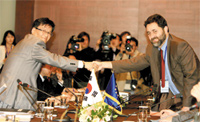In the wake of the Cold War, a distinct trend toward regionalism emerged. Countries like the Republic of Korea, which have pursued export-led growth, found themselves facing a different international economic environment than in the past.
Korea's export growth mostly depended on trade with advanced countries ― the United States, Japan and the European Union. This has often caused friction over trade imbalances. With Korea gradually increasing its trade with developing countries, however, the reliance on trade with advanced countries has steadily declined.
The Republic of Korea's trade with developing countries and the nations of Eastern Europe will continue to expand as long as Korea's economy and trade continue to grow and the nation's industrial structure continues to focus on technology-intensive activities. Once Korea has completed its industrial restructuring, it will be able to make a greater contribution to international economic development by accelerating cooperation with developing countries on the basis of its comparative advantages and complementing sectors.

Assembly line at LG's Polish LCD cluster
To the extent that advanced countries remain key to trade and crucial as partners in industrial science and technology, Korea will endeavor to minimize friction through the reciprocal opening of its industrial, agricultural and service markets.
Global environmental issues, such as depletion of the ozone layer, global warming and deforestation have emerged as new challenges to people throughout the world. After participating in the June 1992 United Nations Conference on Environment and Development (UNCED) ― the Earth Summit ― the Korean Government concluded continuous economic development could not be allowed to harm the environment on which we all depend. Most Koreans strongly support efforts to balance economic development and environmental protection through the adoption of the Rio Declaration and other global environmental accords.
The Uruguay Round basically provided for a comprehensive reduction in tariffs and a general removal of non-tariff trade barriers, a crucial step in the global movement toward free trade. The Republic of Korea is proactively opening its markets to support a global free trade system.

Korea-EU FTA: South Korea's chief negotiator to the Korea-EU Free Trade Agreement talks and his EU counterpart shake hands at the opening of the sixth round of their talks in Seoul.
Korea has signed free trade agreements (FTAs) with 16 countries, including Chile, Singapore, the European Free Trade Association (EFTA), ASEAN, and the U.S. Currently, negotiations with the EU, Canada and India are under way with the aim of concluding them by the end of 2008, and the groundwork is being laid for FTA negotiations with China, MERCOSUR and the Gulf Cooperation Council (GCC) at the government level. In the case of unfair import restrictions from trade partners, Korea has resolved the issues either through bilateral channels or by making full use of the WTO's dispute settlement procedure.